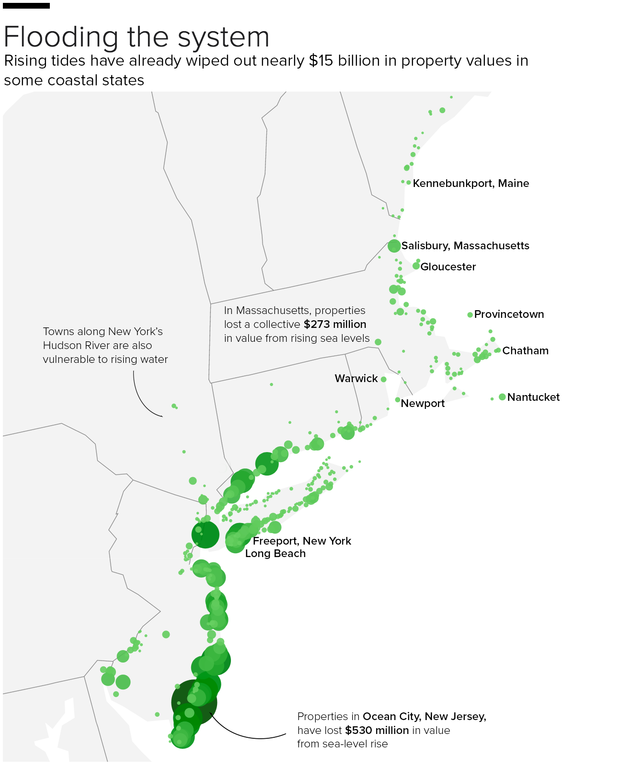In New England, home prices fall as seas rise
A rising tide may lift all boats, but that doesn't apply to coastal real estate. Higher sea levels have slashed the home values of four New England states by more than $400 million over a dozen years, according to research from the Brooklyn-based nonprofit First Street Foundation.
Massachusetts' property owners have suffered the biggest losses, with rising sea levels responsible for lowering the total value Bay State homes by more than $273 million. Maine is next, with nearly $70 million in losses, followed by Rhode Island at roughly $45 million. Losses in New Hampshire, which has the shortest coastline in New England, topped $15 million.
One extreme example includes a house in Boston currently valued at $373,725 that would have been worth almost $800,000 if not for the higher sea level.
Homeowners can find the information on a website called FloodIQ, which gives access to public data crunched in a way only previously undertaken by private companies such as insurers and Wall Street firms, which use the data to evaluate investments and risk. Coastal homes may face greater dangers from flooding and storms than inland properties, damping their market value and crimping a region's tax base.
The project seeks to "level the playing field" for homeowners and municipalities, said Matthew Eby, First Street Foundation's executive director, in an interview with CBS MoneyWatch.
Now, "individual homeowners can understand the impact of sea level rise and flooding to their property which is, for the vast majority of Americans, their most valuable asset," Eby said.
The research focuses on the impact of rising tides between 2005 to 2017 for 2.5 million coastal properties, rather than the cost of damage tied to specific events like storms known as nor'easters. It uses assessed property values and layers in potential lost appreciation compared with similar homes, among other factors.
The study didn't look at Vermont, the only landlocked New England state, while Connecticut was included in an earlier report.
Sunny-day flooding
Researchers said they took pains to create a "like-for-like" comparison for what's called "sunny-day flooding" or rising water strictly due to higher tides, by eliminating other factors that typically impact a real estate market from the analysis.
Earlier First Street Foundation reports found housing values in Connecticut, New York, New Jersey dropped by $6.7 billion over the same period, and estimated five southeastern coastal states lost $7.4 billion in value.
The data may also prove useful for city planners looking at neighborhoods that might be falling in value, and therefore cutting into tax revenue, Eby said.
How to preserve that value is a growing concern.
Holding back the tide
Maine's voters last year passed a more than $100 million bond that in part will be used to upgrade eroding roads, bridges and waterways. Better access to properties can mean higher property values, and for municipalities, more tax revenue.
In Boston, Mayor Marty Walsh last year unveiled a plan to protect the city — which has a waterfront exploding with billions in development -- from flooding as seas are forecast to rise 1.5 feet by 2050. And the New Hampshire legislature is considering ways to boost funding to hold back rising tides on its relatively small coast lined with resort towns.
The data on FloodIQ only takes into account past events, but the clock is only speeding up when it comes to rising tides, experts say.
"There will be an exponential loss in the years to come unless there are adaptation measures that are put in place to prevent that," said Jeremy Porter, a Columbia University lecturer and First Street Foundation statistical consultant. The researchers plan to continue releasing data for the entire U.S. coastline, then expand to other bodies of water.
Adjacent neighborhoods
The First Street Foundation's studies provide the latest evidence that rising seas are shifting people's preferences for living along coastlines. Last year, a torrent of studies, from the Union of Concerned Scientists studying seaside towns to the Journal of Financial Economics, showed rising seas are eroding property values amid climate change.
The First Street Foundation study is unique because it takes a wider swath of complex data and illustrates how eroding values are impacting not only ocean-front property, but homes in adjacent areas, Jesse Keenan, who teaches urban development and climate adaptation at Harvard University's Graduate School of Design, told CBS MoneyWatch.
"It's a technology and it's an interface that begins to translate this complexity to a consumer audience," Keenan said. Because the data isn't targeted to financial markets, "the public good may be possibly advanced."




